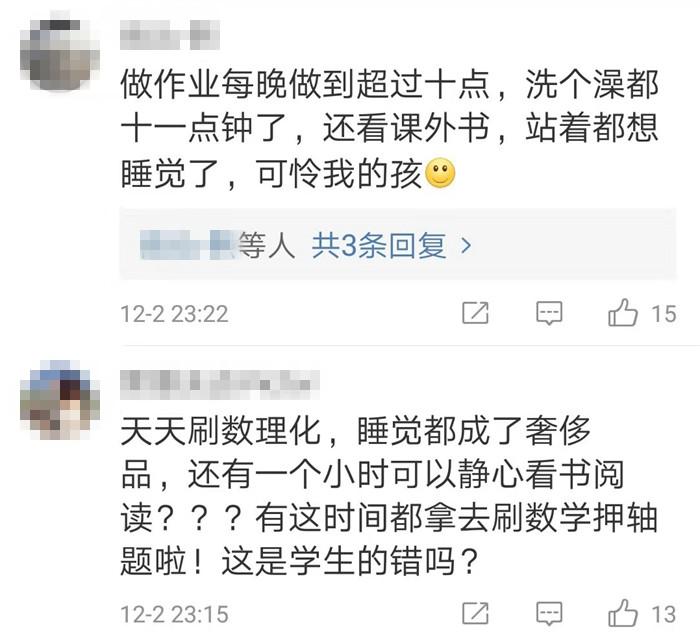Beijing, Dec. 5 (Reporter Shangguan Yun) People have always attached great importance to reading and adopted various methods to cultivate reading habits and interest. Zhu Xi once said, "The method of reading is gradual, familiar and thoughtful."
However, a few days ago, # Nearly 70% of students read less than one hour after class every day # boarded a hot search: "Investigation Report on the Status of Reading and Writing in Primary and Secondary Schools (2019)" showed that about 19.6% of the respondents read less than 0.5 hours a day, and 50% of the respondents read for 0.5-1 hour a day (excluding 1 hour).
This research result has also attracted many people’s attention: What is the importance of extracurricular reading? How long is the appropriate reading time for students?

Data Map: During the National Day, the flow of people in bookstores increased significantly, mainly students. Photo by Li Nanxuan
The report shows thatNearly 70% of primary and secondary school students read less than one hour a day.
A few days ago, the Investigation Report on the Current Situation of Reading and Writing in Primary and Secondary Schools (2019) (hereinafter referred to as the Report) was released at the 5th China Education Innovation Achievements Expo. It shows that nearly 70% of primary and secondary school students spend less than one hour reading every day.
According to the Report, about 89.4% and 90.4% of the respondents are interested in reading and extracurricular reading respectively. However, the reading time of the respondents is worrying. About 19.6% of the respondents read less than 0.5 hours a day, and 50% of the respondents read 0.5-1 hour a day (excluding 1 hour).
However, extracurricular reading is not long, but it has little to do with the number of books. The above Report also shows that about 81.8% of the respondents said that there are abundant reading materials to read, 78.9% of the respondents have more books at home, 86.8% of the respondents are free to choose reading materials, and 69.4% of the respondents often buy books.
Moreover, with the increase of age, the number of students who read less than one hour a day has increased significantly. "So for primary and secondary school students, interest is not a problem, reading is not a problem, and time is the problem." Feng Wang, the author of the Report and a professor of Chinese Department in Peking University, said.
"There is a lot of discussion about reading and writing. We do this research because we want to do some empirical research. " Li Ermin, the research partner and vice president of China Institute of Educational Innovation of Beijing Normal University, revealed that extracurricular reading is not only related to time, but also to many factors such as reading quality.
Where did all the time for extracurricular reading go?
So, where did the children spend their extracurricular reading time?

Image source: Weibo screenshot
In this regard, some netizens said, "There is a lot of homework. As long as you don’t read supplementary books and the designated bibliography of the college entrance examination, you will be considered to be in ‘ Read casual books ’ Even if it is a world famous book. Exercise time is not enough, not that children are lazy. "
Some people also lamented that, except for the extra time in primary school, the homework in junior high school is ok, and in senior high school, it may not be finished at 11 o’clock in the evening, but for the efficiency of attending classes the next day, we must make up our sleep quickly … … University time is abundant, but it lacks the heart that I was willing to study when I was a child.
"My daughter finishes school at 3: 30 every afternoon, and there is not much homework." Liu Xue (pseudonym) is the mother of a primary school student. She said that her daughter has to practice the piano for an hour every night, and the extracurricular reading time is about half an hour every day. "I will watch more on weekends."
In order to protect children’s eyesight and adequate sleep time, Liu Xue did not ask children to have longer extracurricular reading every day. "However, we should try our best to plan extracurricular reading time scientifically. Reading and studying should be a lifetime thing. "
"Parents may be confused: How long should children spend reading outside class every day? This problem is difficult to cut across the board, which is related to the children’s learning period and their reading ability, and should be arranged reasonably according to their own situation. " Li Ermin mentioned, but it must be admitted that the time spent by primary and secondary school students on reading is really insufficient in general. "Many studies and surveys support this. The data presented in this Report is also. "
Reading after class is more than reading literary works.
In fact, in the hearts of many netizens who lament the lack of time, extracurricular reading is often understood as reading literary works, but Feng Wang introduced in an interview with a reporter from Zhongxin. com that, broadly speaking, reading literary works can be included, including reading newspapers and so on.
"Extracurricular reading refers to personal reading practice outside the classroom." Feng Wang believes that in class, teachers have taught some techniques or made some demonstrations, but if students want to turn these into their own abilities, they must put them into practice. "Although it is called extracurricular reading, it is not amateur and dispensable."

Data map. The picture shows World Book Day. More than 100 pupils in Yangzhou spelled out a huge Chinese character "book". Photo by Meng Delong
Feng Wang thinks that reading practice is very important. For example, in sports training, the coach has taught some skills and put forward some basic requirements, and everyone has to implement the training to really master it. Reading is the same. Without your own practice, it is impossible to internalize your own reading ability.
At the same time, he pointed out that a lot of homework is intellectual, even some technical repetitive exercises, and less time is left for comprehensive and holistic activities like reading.
"In fact, all disciplines can get through. Reading is not necessarily just reading literary works, just reading things related to Chinese classes, mathematics, science, etc. " Feng Wang thinks that the literacy of other subjects can be integrated, and reading time will be available.
Can reading and writing be more systematic?
In addition, in response to many people’s exclamation that "time is not enough", Feng Wang also believes that if reading education can be done as mentioned above, students should have time. But now it is actually taken up by other aspects of practice. "In the final analysis, it is still a matter of concept."
Feng Wang said that the education sector can actually seriously discuss how to turn reading and writing into a more systematic and framed reasonable arrangement through various efforts. "Like reading courses and writing courses, they should all stand alone, not outside the curriculum, but the core part of the whole curriculum education."
"Besides, reading itself is an important foundation of learning — — After learning to read, you can learn by reading. " Feng Wang said.